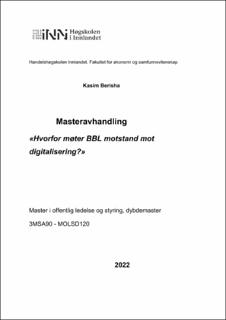| dc.contributor.advisor | | |
| dc.contributor.author | Berisha, Kasim | |
| dc.date.accessioned | 2023-04-24T16:10:36Z | |
| dc.date.issued | 2022 | |
| dc.identifier | no.inn:inspera:110525620:38761362 | |
| dc.identifier.uri | https://hdl.handle.net/11250/3064589 | |
| dc.description.abstract | Digitalisering handler i stor grad om anvende teknologien til å utvikle, forenkle og forbedre samfunnet generelt. De siste årene fra 2019 – 2022 har den teknologiske utviklingen satt fart i arbeidslivet, og sine preg, som sådan har medført til de fleste tilfeller en omstilling. Det kan være alt fra å innføre nye arbeidsoppgaver, oppgradering av IT-programmer for økt effektivitet, og atomisering til omstrukturering i organisasjoner. Imidlertid har studier vist at en betydelig andel viser motstand mot digitalisering, eller innehar en negativt innstilling til omstillingen. Siden hele arbeidslivet er digitalisert i ulike grad, vil det desto være større grunn til å undersøke hvilke forhold som oppstår utilsiktede og bidrar til motstand ved digitaliseringsprosjekter, ettersom dette vil avgjøre om prosjektet blir vellykket eller ikke.
Denne studiet har som hovedmål å gi økt forståelse for negativitet til omstilling, og dypere innsikt på årsaksfaktorene som ligger til grunn.
Analysemetoden gjøres todelt; Først undersøker jeg om det faktisk har vært motstand mot digitalisering i BBL, gjennom å avdekke ansattes syn på dette. Deretter utleder jeg to hypoteser basert på eksisterende forskning. Min forventning er at jeg også ville kunne se slik motstand mot digitalisering i BBL.
I den første analysedelen finner jeg tydelige indikasjoner på at det foreligger ulike forhold som skaper motstand hos BBL. Disse forholdene er medvirkning, kompetanse/ teknologiske programmer, holdninger, kultur og ledelse.
I den andre delen diskutere jeg funnene og relevansen til de to hypotesene om hvorfor det er motstand, som før øvrig blir fremstilt i en tabell for helhetlig oversikt.
Hovedfunnene i analysen indikerer en klar sammenheng mellom medvirkning, og kommunikasjon, og nøkkelbegrepet er opplæring som den største årsaken til hvorfor motstandsformen kan oppstå i slike prosjekter. Hypotesene får noe støtte basert på funnene i analysen og gir en viss indikasjon og nyanse på hvorfor det har vært motstand mot denne digitaliseringsprosjektet i BBL. | |
| dc.description.abstract | Digitization is largely about using technology to develop, simplify and improve society in general. In recent years from 2019 - 2022, technological development has accelerated working life, and its character, as such, has led to a change in most cases. It can be anything from introducing new work tasks, upgrading IT programs for increased efficiency, and atomization to restructuring in organizations. However, studies have shown that a significant proportion show opposition to digitalisation, or have a negative attitude towards the changeover. Since the entire working life is digitized to varying degrees, there will be even more reason to investigate which conditions arise unintentionally and contribute to resistance in digitization projects, as this will determine whether the project will be successful or not.
The main goal of this study is to provide an increased understanding of negativity for change, and a deeper insight into the underlying causal factors.
The analysis method is made in two parts; First, I investigate whether there has actually been opposition to digitization in BBL, by uncovering employees' views on this. Then I derive two hypotheses based on existing research. My expectation is that I would also be able to see such opposition to digitization in BBL.
In the first part of the analysis, I find clear indications that there are various conditions that create resistance in BBL. These conditions are participation, competence / technological programs, attitudes, culture and management.
In the second part, I discuss the findings and the relevance of the two hypotheses about why there is resistance, which are otherwise presented in a table for a comprehensive overview.
The main findings in the analysis indicate a clear connection between participation and communication, and the key concept is training as the biggest reason why the form of resistance can arise in such projects. The hypotheses receive some support based on the findings in the analysis and provide a certain indication and nuance of why there has been opposition to this digitization project in BBL. | |
| dc.language | nno | |
| dc.publisher | Inland Norway University | |
| dc.title | Masteravhandling
«Hvorfor møter BBL motstand mot digitalisering?» | |
| dc.type | Master thesis | |
